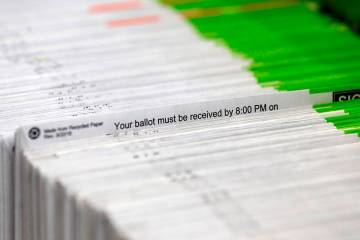EDITORIAL: Just power up those federal printing presses
In another sign that concerns about spending have all but vanished inside the Beltway, The New York Times carried a lengthy piece last week noting that the U.S. debt now exceeds the size of the entire American economy, the point many economists once warned could trigger a massive downturn.
But nothing has happened.
“Fiscal constraints aren’t nearly what economists thought they were,” one Wall Street executive told the Times. “When you have a central bank essentially funding these deficits, you can take debt to higher levels that previously envisioned.”
But does that mean there truly is no tipping point? For some progressive economists, the answer is clear. Because the United States has so far been able to survive amid massive deficit spending, there’s no reason the nation can’t continue to go further into debt to fund all the “free” stuff that Democrats promise to the masses, they argue.
Welcome to modern monetary theory, which holds that public spending is the key to prosperity and that governments can simply keep printing more of their own currency without any ill effects to fund whatever “investments” they deem appropriate. It’s not surprising that a leading proponent of this outlook, Stephanie Kelton of Stony Brook University, was a senior economic adviser to Sen. Bernie Sanders’ presidential campaign.
The idea that continuously printing more money could, as history has proven many times, lead to massive inflation, eroding the buying power of those who can least afford it, is seen by proponents of the theory as an exaggerated byproduct that will naturally be constrained by excess “slack” in the economy. But using this logic, there’s no need for federal taxes because new spending can be financed by simply ginning up the printing presses. But then again, in the progressive universe taxes aren’t necessary for the revenue they generate, but as a tool to punish the successful.
In fact, modern monetary theory seems as if it were reverse engineered to provide cover for those who see no limit to how large and intrusive the federal government could become — if it were expanded in service to the ideals of compassionate left-wing bureaucrats, of course.
When you couple the emergence of this school of thought to progressive opinion organs such as the Times now opining that massive deficits pose few long-term problems, it becomes clear what one might expect from a Joe Biden presidency in terms of fiscal policy. What could possibly go wrong?
In a Wall Street Journal review of Ms. Kelton’s new book, John H. Cochrane of the Cato Institute notes that the author’s “logic, facts and language turn into pretzels” when “the implications don’t lead to her desired conclusions.” He concludes that, “Skeptics have called it magical monetary theory. They’re right.”
Can the nation survive it? We may be on the verge of finding out.




























